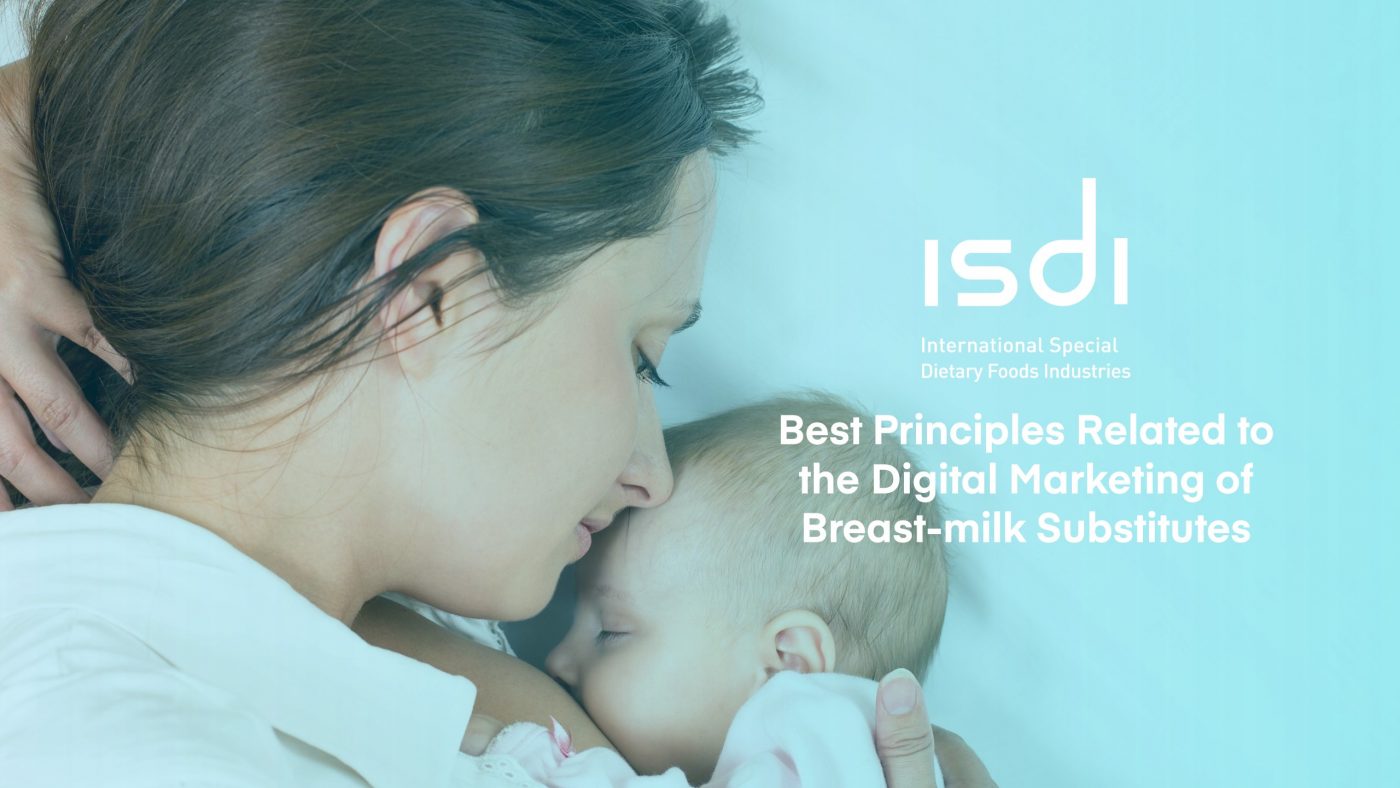Position papers Infant Formula
ISDI Best Principles Related to the Digital Marketing of Breast-milk Substitutes
Download the ISDI Best Principles Related to the Marketing of Breast-milk Substitutes
A. Overall Principles
- The International Special Dietary Foods Industries (“ISDI”) and its members acknowledge the importance and respect the aim and principles of the World Health Organization’s 1981 International Code of Marketing of Breast-Milk Substitutes (the “WHO Code”), the stated aim of which is “to contribute to the provision of safe and adequate nutrition for infants, by the protection and promotion of breastfeeding, and by ensuring the proper use of breast-milk substitutes, when these are necessary, on the basis of adequate information and through appropriate marketing and distribution.”
- ISDI supports the WHO’s recommendation for exclusive breastfeeding in the first six months of life, followed by continued breastfeeding for up to two years and beyond. ISDI and its members are committed to ethical and responsible marketing in all forms, so as not to undermine a mother’s choice to continue to breastfeed. This includes all aspects of digital marketing, in addition to full transparency and protection of consumer data and privacy.
- These best practices aim to contribute to the safe and adequate nutrition for infants, by supporting and protecting breastfeeding and by ensuring the ethical and responsible digital marketing of “breast-milk substitutes”, as defined by national law.
- The marketing of breast-milk substitutes, including through digital means, is subject to relevant national laws and regulations or government-issued codes. ISDI and its members are committed to complying with all laws and regulations in the countries in which they operate, to respect local social and cultural practices, and to conduct their business with integrity. Existing laws, regulations and codes already cover all forms of marketing, including digital marketing. Best practices are not a substitute for such laws. Rather, they represent voluntary guidance for ISDI members. National laws and regulations shall prevail.
- ISDI and its members are similarly committed to comply with relevant international food standards, such as Codex Alimentarius.
- ISDI recognizes that the right nutrition has a critical impact on a child’s growth and development. The WHO recognizes that breast-milk substitutes are the “best available nutritional alternative”[1] when providing breastmilk is not possible. When breastfeeding is not an option, parents and caregivers should have access to scientific, and evidence-based information on alternative feeding choices. This enables parents and caregivers to be able to make informed choices. ISDI and its members are committed to improving nutrition and providing the highest quality products that help meet the nutritional needs of mothers, infants and children, and to enable parents and caregivers access to science-based information.
- Access to accurate and scientifically validated nutrition information is critical for healthcare professionals to provide the best nutritional advice and to enable parents and caregivers to make informed decisions about the most suitable nutritional options for their infants and young children.
B. Company Websites
- ISDI members provide consumers information about the benefits and the superiority of breastfeeding, as outlined by the WHO Code. Therefore, ISDI members should provide this information on their company website, for example, through a tab or link labelled “Breastfeeding is Best,” “Benefits of Breastmilk” or embedded in the overall Website content, which provides scientific, factual information about breastfeeding and breast-milk substitutes.
- Unless otherwise permitted by law, information provided on company websites should include the following information in accordance with Article 9 of the WHO Code and relevant Codex Alimentarius standards (“Important Message”): (a) the words “Important Notice” or their equivalent; (b) a statement of the superiority of breastfeeding; (c) a statement that the product should be used only on the advice of a health worker as to the need for its use and the proper method of use; (d) instructions for appropriate preparation, and a warning against the health hazards of inappropriate preparation.
- Unless otherwise permitted by law, the inclusion of product information about breast-milk substitutes, such as a description and pack shots, on a Website is acceptable, provided: (i) best practices set out in paragraphs 8 and 9 are followed, where permitted by law; and (ii) any information is factual in nature and intended to help consumers make an informed choice on how to feed their babies.
C. Frequently Asked Questions (FAQ)
- FAQ pages on Websites are an important means of providing information on breast-milk substitutes to consumers, as well as assisting healthcare professionals and caregivers in differentiating between different feeding options.
- On FAQ pages, if parents or caregivers have questions seeking medical advice, the FAQ should direct consumers to consult their pediatrician or healthcare professional.
D. Other digital communications and social media
- In accordance with these best practices, ISDI members acknowledge that existing regulations cover all forms of marketing, including digital marketing. ISDI supports transparency, data privacy and other related nationally-applicable measures, in managing digital communications and social media platforms to ensure compliance with relevant local laws.
- Digital communications and social media should not contain any medical advice to parents and caregivers, but should instead recommend that consumers consult their pediatrician or healthcare professional for medical advice.
- Unless otherwise permitted by law, communications to consumers via social media forums and other electronic platforms should only include factual and scientific information related to breast-milk substitutes (including, but not limited to, announcements about a change of availability, change of labels, reformulation or quality, as well as urgent health and safety matters). Unless otherwise permitted by national law, the communication should include the Important Message.
[1] WHO e-Library of Evidence for Nutrition Actions, “Regulation of marketing breast-milk substitutes”, last updated 11 February 2019 (link).

